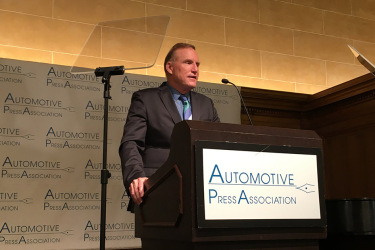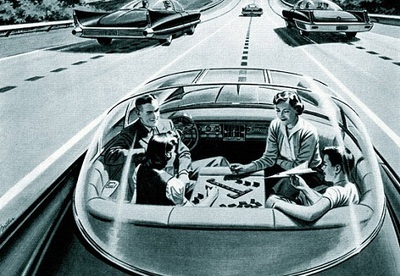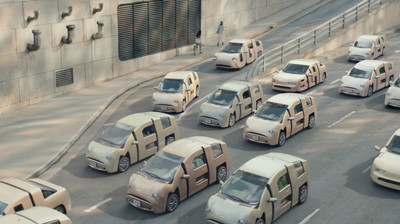Right Answers? Wrong Questions! Exploding EV and other myths
SEE ALSO: Bloomberg: Top Auto Dealer Says Robo-Taxi Hype Has Reached ‘Peak Absurdity’
By Martha Hindes
Senior Editor
Michigan Bureau
The Auto Channel
Detroit, October 9, 2018 -- Don't get him wrong. Wes Lutz doesn't dislike auto journalists. He just thinks they haven't been asking the right questions and he wants to give them a dose of reality. Call it a heavy duty little slap on the wrist.
 |
The opening remarks by the current chairman of the National Automobile Dealers Association (NADA), "I don't want you to believe a word I say," was an indication his presentation at the Automotive Press Association in Detroit on Tuesday would not be more of the same.
Lutz, a 40-year Chrysler-Dodge-Jeep-Ram auto dealer from Jackson, Michigan, has heard all of the so-called "myths" going around, as the automotive scene -- in the U.S. and worldwide -- continues a breakneck shift from plain old fashioned gasoline or diesel car or truck buying to every imaginable variation. Those earlier vehicles that have sustained generations of vehicle consumers for years are becoming the current stepchild of transporting people from here to there. But, says Lutz, one needs to look past the outward advantages of emerging alternatives before assuming everything that's presented is correct.
Despite these being "incredibly exciting times" in the industry, those news media covering it that should have a "healthy scepticism" are not asking enough critical, sometimes disruptive questions, not challenging enough assertions, not asking for enough proof. (Except for The Auto Channel, see below) Those are what need to be examined in the face of widespread proclamations of the superiority of emerging technologies and ownership trends, from electric or automated vehicles (EVs or AVs) to the "personal mobility" advantages of ride sharing or subscription-based vehicle usage versus outright ownership or leasing. Rather, they are letting the narrative -- perpetuated by companies that have the biggest financial stake in the outcome -- define what is newsworthy.
Among the myths: people no longer will be buying cars and trucks, automated self-driving vehicles are needed to eliminate traffic problems, and dealers will go kicking and screaming into an electrified future as technological changes come on board.
The widely reported cost savings of electric vehicles compared with their liquid-fueled counterparts is one of those advantages that this summer was refuted by a study by the Automobile Association of America (AAA) Foundation for Traffic Safety. The study also showed in 20 of the largest U.S. urban areas, the cost of ride hailing services was at a minimum twice the cost of owning a personal vehicle, in this case a mid-sized sedan with all the associated costs of vehicle ownership such as fuel, insurance, taxes, servicing and even parking in the same urban area. The finding was $20,118 for a year of ride hailing versus $10,049 for a personally owned vehicle, or $7,321 excluding parking.
With Uber and Lyft as much as three-times more expensive than personal ownership, he predicted that people aren't going to stop buying cars, but will continue to own vehicles but use those services on occasion. That's an evolution, not a revolution, he said. "People want freedom, flexibility, convenience and control."
And rather than reducing traffic congestion, studies show that ride hailing has added 5.7 billion of miles of driving in the nation's nine largest areas.
Another myth, that automated vehicles are immeasurably safer than human driven ones -- despite a lack of data -- is based on an assumption that humans need to be retrained in how to function as pedestrians because people act unpredictably. "In other words, we're crossing the street the wrong way."
 |
And rather than a need to perhaps reprogram vehicle drivers, Lutz said statistics prove otherwise. The widely-publicized 37,000 traffic fatalities last year was while American drivers clocked in 3.2 trillion miles on the road. While not minimizing the impact, he said that was 342 years of continuous driving for a year for every traffic death. Unlike the conventional wisdom, "...the reality is humans are phenominally good drivers..." and improved safety technology on human driven vehicles, well short of autonomous, is making them even better drivers.
What should be asked, said Lutz, is what's coming along in five years that won't require removing driving from the human? And is it possible the person making the bold assertion about the supremacy of automated vehicles has a financial stake in having it regarded as true in the short term?
A third myth regards blaming dealer reluctance for lackluster EV sales in the U.S., while they are more expensive, without nearly the same resale value, can't be refueled easily or quickly, could be obsolete in a year and have the same maintenance costs for tires, brakes, suspensions, alignments and electrical systems as conventional vehicles. Those are the same services needed by gasoline or diesel powered vehicles that put less strain on those vehicle systems because of lighter weight and less aggressive acceleration.
Lutz said he always sells what his customers want.
Consumers should have a broader array of personal transportation choices, he added. And those covering the industry from a news perspective need to be rooted in reality, not in what Wall Street says. "Find out what they aren't telling you."
Copyright 2018, Martha Hindes, Automotive Bureau, All rights reserved.
Despite these being "incredibly exciting times" in the industry, those news media covering it that should have a "healthy scepticism" are not asking enough critical, sometimes disruptive questions, not challenging enough assertions, not asking for enough proof. (Except for The Auto Channel, see below) Those are what need to be examined in the face of widespread proclamations of the superiority of emerging technologies and ownership trends, from electric or automated vehicles (EVs or AVs) to the "personal mobility" advantages of ride sharing or subscription-based vehicle usage versus outright ownership or leasing. Rather, they are letting the narrative -- perpetuated by companies that have the biggest financial stake in the outcome -- define what is newsworthy
SEE ALSO: CARB, GM, SoCal Edison and Others Join Forces to Keep California in the Lead of the Great Electric Vehicle Scam +VIDEO
SEE ALSO:Electric Vehicles, An Environmental Solution or Anti-American Diversion? Or A China Manipulated Tulip-like Mania
SEE ALSO:China EV Monopoly Aided By "Tra-la-la" US Politicians - Nine U.S. States Pressure Automakers on Evs
SEE ALSO:Autonomous Driving May Kill The Automobile Industry And Our Freedom Of Mobility
SEE ALSO:The Beginning Of The End Of Our Freedom Of Mobility - New Autonomous Vehicle Platform Connects Road Authorities with Vehicle Operators
SEE ALSO:Silicon Valley On Its Way To Disrupt The Auto Industry and The Historic Need For Traditional Car Companies



